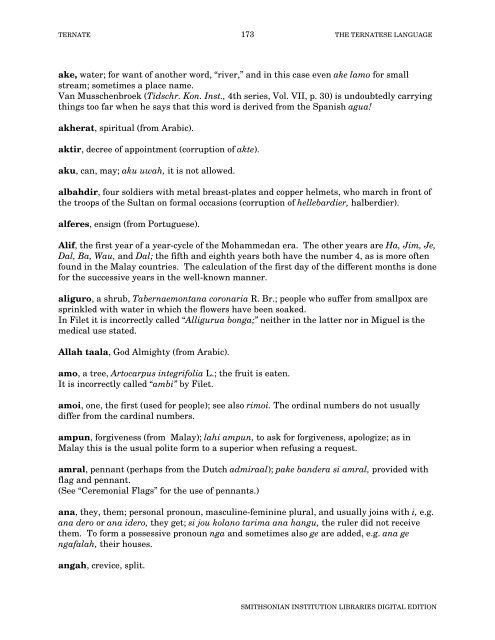Ternate - Smithsonian Institution Libraries
Ternate - Smithsonian Institution Libraries
Ternate - Smithsonian Institution Libraries
Create successful ePaper yourself
Turn your PDF publications into a flip-book with our unique Google optimized e-Paper software.
173<br />
TERNATE THE TERNATESE LANGUAGE<br />
ake, water; for want of another word, “river,” and in this case even ake lamo for small<br />
stream; sometimes a place name.<br />
Van Musschenbroek (Tidschr. Kon. Inst., 4th series, Vol. VII, p. 30) is undoubtedly carrying<br />
things too far when he says that this word is derived from the Spanish agua!<br />
akherat, spiritual (from Arabic).<br />
aktir, decree of appointment (corruption of akte).<br />
aku, can, may; aku uwah, it is not allowed.<br />
albahdir, four soldiers with metal breast-plates and copper helmets, who march in front of<br />
the troops of the Sultan on formal occasions (corruption of hellebardier, halberdier).<br />
alferes, ensign (from Portuguese).<br />
Alif, the first year of a year-cycle of the Mohammedan era. The other years are Ha, Jim, Je,<br />
Dal, Ba, Wau, and Dal; the fifth and eighth years both have the number 4, as is more often<br />
found in the Malay countries. The calculation of the first day of the different months is done<br />
for the successive years in the well-known manner.<br />
aliguro, a shrub, Tabernaemontana coronaria R. Br.; people who suffer from smallpox are<br />
sprinkled with water in which the flowers have been soaked.<br />
In Filet it is incorrectly called “Alligurua bonga;” neither in the latter nor in Miguel is the<br />
medical use stated.<br />
Allah taala, God Almighty (from Arabic).<br />
amo, a tree, Artocarpus integrifolia L.; the fruit is eaten.<br />
It is incorrectly called “ambi” by Filet.<br />
amoi, one, the first (used for people); see also rimoi. The ordinal numbers do not usually<br />
differ from the cardinal numbers.<br />
ampun, forgiveness (from Malay); lahi ampun, to ask for forgiveness, apologize; as in<br />
Malay this is the usual polite form to a superior when refusing a request.<br />
amral, pennant (perhaps from the Dutch admiraal); pake bandera si amral, provided with<br />
flag and pennant.<br />
(See “Ceremonial Flags” for the use of pennants.)<br />
ana, they, them; personal pronoun, masculine-feminine plural, and usually joins with i, e.g.<br />
ana dero or ana idero, they get; si jou kolano tarima ana hangu, the ruler did not receive<br />
them. To form a possessive pronoun nga and sometimes also ge are added, e.g. ana ge<br />
ngafalah, their houses.<br />
angah, crevice, split.<br />
SMITHSONIAN INSTITUTION LIBRARIES DIGITAL EDITION

















